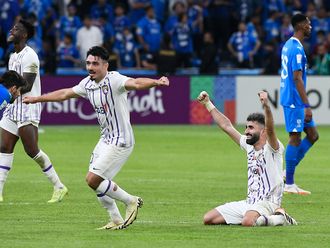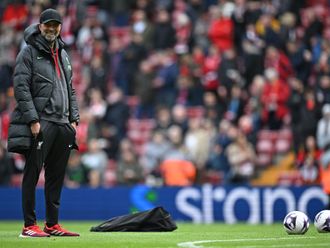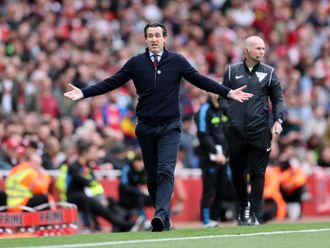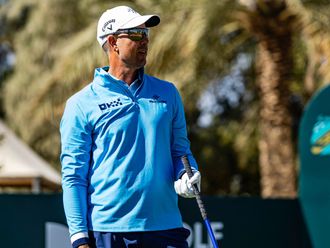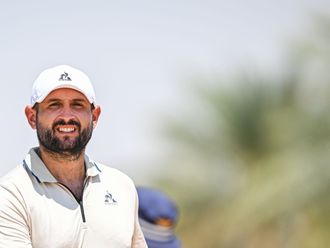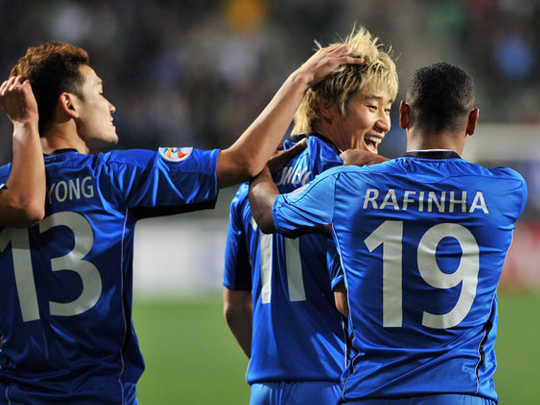
Ulsan, South Korea: Asia’s oldest professional league is going through a difficult time after the 2011 match-fixing scandal, the domestic domination of baseball and falling attendances, compounding the pressure on Ulsan Horangi to give Korean football a boost by defeating Al Ahli of Saudi Arabia for the continental club championship.
A win for Ulsan on Saturday would give South Korea its 10th Asian Champions League title, more than the combined total of the next two most successful nations — Saudi Arabia and Japan.
Primarily motivated by the corruption scandal which resulted in more than 50 players and coaches indicted of match-fixing, shocked officials introduced measures designed to improve the standards of the K-League off the field.
This year has involved relegation introduced for the first time and the 16-team league split into two after 30 games to increase interest and excitement. It is also hoped that these moves will claw back some of the advantage enjoyed by baseball, which in recent years has been consolidating its position as South Korea’s No 1 sport and recently recorded a fourth successive year of record attendances.
In the face of such challenges, the prospect of more Asian success was welcomed by the K-league’s deputy general manager Kwon Sung-jin.
“Off the field, we still have some work to do in terms of marketing and things like that, but the success in Asia shows that we are fundamentally competent on the field,” Kwon said.
“In the past in South Korea, the national team results and performance was the only important thing for most people, but recently the importance of club football has grown in terms of standards of play and marketing. It helps us feel that club football is an important and good indicator of a nation’s football level.”
South Korea has won three of the last six titles and only the surprise defeat of Jeonbuk Motors to Qatar’s Al Sadd in 2011, after a penalty shoot-out, prevented a fourth triumph.
Ulsan has never have appeared in the ACL final before but is keen to continue Korea’s proud tradition. The team, known as the Tigers, progressed smoothly out of the group stage, defeated Japanese champion Kashiwa Reysol in the second round, thrashed Saudi powerhouse Al Hilal 5-0 on aggregate in the quarter-final and then strolled into the final with a 5-1 win over two legs against Uzbekistan title-holder Bunyodkor.
“We know how teams from the Middle East play,” Ulsan attacker Lee Keun-ho said. “We have seen videos of Al Ahli and while they are obviously a good team full of players with technical ability, we think that we can get behind them and cause problems.”
Lee is also a South Korea national team regular and along with fellow international teammates Kim Shin-wook and captain Kwak Tae-hwi ensures that Ulsan has a strong spine. Brazilian striker Rafinha has also been saving his best form for Asian teams. Kim and Rafinha have scored four goals each in the knockout stage while Victor Simoes is Al Ahli’s dangerman — the Brazilian has scored seven goals in the tournament overall this year.
Al Ahli reached the final in 1986 but, despite playing at home, were defeated by Daewoo Royals of South Korea. With just two domestic league titles, it has been living in the shadow cast by city rivals Al Ittihad, eight-time Saudi champions and back-to-back Asian Champions League winner in 2004 and 2005.
The two Jeddah teams met in the semi-final, playing both legs at the stadium they share in the city. Al Ittihad won the first game 1-0 but in the second, Al Ahli came back to win 2-0.
“I want to thank my players and our fans who stood next to us and supported the team throughout the match. Our focus was on this match and we will now start preparing for the match against Ulsan,” said the team’s Czech coach, Karel Jarolim.
Home advantage may not be that important for Ulsan, which has performed well away from home, scoring 14 goals in five games outside Korea in contrast to 10 from six at its World Cup Stadium.
The team’s domestic form has been poor, with just three points from the last seven games, but Ulsan is unbeaten in the continental competition. As the final has approached, Ulsan has been happy to sacrifice league points in the search for Asian glory and the K-League seems quite happy with that.
“We are not quite sure why Korean teams are so successful in Asia but we know it is good for the K-League,” Kwon said.


